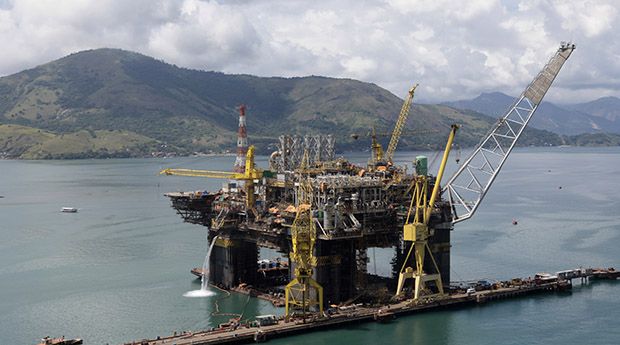Where once there would have been a clamour to snap up Petrobras debt, now the shadow of bribery and corruption taints all that it does, such that some fear the government itself may be brought down. So what’s next for one of the emerging world’s most influential and indebted corporates?
What to do with Petrobras? Embroiled in a corruption scandal that shows no sign of ending, the Brazilian energy giant faces a truly miserable year ahead.
Wherever the company looks, it sees enemies and threats. A political elite fearful of being entangled in its woes, or determined to shine a light on its allegedly shady practices. A jittery investor base uncertain of the company’s true value, or the extent of its once-unquestioned political support. And a perilous race to source enough cash to finance investment plans and service its colossal debt burden.
First things first. This is no ordinary company. In many ways (too many, prosecutors allege) it blurs the line between corporation and government. It’s also both huge, and hugely indebted. It completed what was then the world’s largest share offering in September 2010, raising US$70bn. Three years later, it reported gross debts of more than US$135bn, making it the world’s most heavily indebted oil producer.
For years it was the darling of bankers keen to profit from the firm’s virtually unquenchable thirst for paper. Yet in recent months, all of its hard work has come undone. A year-long investigation, codenamed “Operation Car Wash”, has entangled domestic individuals and corporates, and called into question the actions and motives of a host of global multinationals. Company directors are accused of taking bribes from construction firms and slipping cash into the pockets of friendly politicians.
According to statements from the Federal Police Department, around US$3.9bn in “atypical financial transactions” were siphoned into the political realm between 2004 and 2012; since September 2014, Brazilian courts have blocked US$270m in assets belonging to suspects involved in the prosecution, and identified US$22bn worth of contracts connected to Petrobras, describing them as “suspicious”.
Then there’s the company itself. Petrobras faces a hideous battle not just to restore its reputation, but also to shore up its fragile finances. So far, it’s not doing a great job with either.
One of the starkest challenges facing the company is a compelling need to become both slimmer and more realistic in its ambitions. In February, its new chief executive, Aldemir Bendine, announced plans to slash expenditure by downsizing the firm’s US$206.8bn investment plan, and flagged up the need to sell shares in several of the firm’s more profitable divisions. The same month, the firm hired JP Morgan to identify around US$3bn in immediate asset sales in the hope of mollifying investors.
This is a well-worn path for any major corporate facing a battle for survival: slash costs, shed or list assets, and sweat every investment dollar in the hopes of turning the company around. It’s the model used by British oil giant BP following the Deepwater Horizon oil spill in 2010, and the attempt, post-financial crisis, to reverse the ailing fortunes of America’s leading auto producers.
But the challenges facing Petrobras are far greater, and for several reasons. It desperately needs to raise fresh capital to service its debt pile, which stands at US$55.7bn. In a perfect world, that wouldn’t prove too hard: a super-large corporate would merely issue a fresh batch of bonds, hungrily devoured by domestic and foreign institutions.
Yet that’s unlikely to happen. Investors, already disturbed by the ongoing graft investigation, were spooked further on February 24, when Moody’s downgraded the company’s credit rating to junk status. The US ratings giant also warned that Petrobras faced “serious near-term liquidity pressure”, and raised the delicate question of when – and indeed if – the firm would formally file audited financial results for the last financial year.
The firm’s stock slid 12% on Sao Paulo’s Bovespa index following Moody’s bombshell. Over the next two days, spreads on the company’s benchmark 2024 bonds widened about 40bp to 572bp.
This is perhaps the biggest procedural challenge facing the firm. Investors want to know the full extent of writedowns stemming from the investigation. Yet Petrobras has ducked such demands. On January 28 it issued unaudited third-quarter results, two months late, that failed to include a dollar-denominated estimate of the likely writedowns (which are expected to be in the order of US$20bn).
Few now expect the firm to produce an estimate until it releases full-year financial results. The firm has until April 30 to file its 2014 audited results and until June 30 to avoid breaching bond covenants, and most expect Petrobras to publish its accounts only at the last possible moment. Others fear the firm may miss both deadlines, pushing its debt into default. In its February report, Moody’s said it saw no signs of “concrete assurance that audited statements will be available by any particular date”.
Investors are now warily eyeing Fitch, which downgraded its rating to BBB– in early February, and Standard & Poor’s. If both cut the firm’s rating to junk status, Petrobras will become one of the largest issuers of high-yield corporate bonds in history. It’s all a far cry from its halcyon days, stretching back to 2007, when a massive pre-salt oil discovery off the coast of Rio de Janeiro raised hopes that Brazil was set to become the world’s latest oil superpower.
Spreading the ills
Nor do the company’s woes stop at its own front door. On January 2, domestic construction firm OAS missed a payment on its 2021 debt in order to preserve liquidity after bring banned from bidding on contracts with Petrobras, a key client.
Judges in Sao Paulo handed down an order to seize 8.9% of the shares held by OAS in Invepar, a Brazilian infrastructure firm part-owned by Petrobras’ pension fund. A host of multinationals, from Danish conglomerate Maersk to Rolls-Royce, which makes gas turbines for Petrobras’ offshore oil platforms, have been ensnared in the investigation.
Nor are the graft allegations against Petrobras simple or singular. Rather, they are a “concatenation of multiple cases strewn around in a multi-jurisdictional environment, covering vendors and contractors both in Brazil and across the world”, said Martin Kenney, a British Virgin Islands-based lawyer who has defended 14 cases of large-scale Brazilian bankruptcy and corruption, involving total losses of US$16bn.
It underlines “the willingness of the country’s political and business elite to lie and steal and cheat, and line their own pockets at the expense of the people they serve”
Two factors are key to understanding the guts of this case. First, said Kenney, it underlines “the willingness of the country’s political and business elite to lie and steal and cheat, and line their own pockets at the expense of the people they serve. I’m a hardened fraud lawyer for 30 years and it still boggles the mind. It’s a terminal cancer – unless you tackle it ferociously it will knock the company, and even the state down.”
Second, Brazil is changing: younger, honest judges and trial lawyers are emerging, intent on sweeping away the corrupt and corruptive practices that have long stunted the country’s potential.
So what’s next for one of the emerging world’s most influential and indebted corporates? Bankers say it’s hard to envisage an even partial break-up of a company that occupies a virtual monopoly position in Brazil’s energy market. The nuts and bolts of the firm’s daily operations – mixing ethanol and delivering petrol to far-flung parts of the country – are still working fine, experts say.
Yet capital expenditure is set to fall not just this year but “for many years to come”, notes one Brazil-based investment banker, with Petrobras also facing the politically sensitive question of whether to slash costs by reducing headcount. For many, it’s hard not to see the sickness corroding Petrobras as merely part of a broader symptom of malaise affecting an economy set to shrink in 2015 for the first time in six years.
And the pain may not stop there. So far at least, the scandal plaguing Petrobras has skirted the higher reaches of the country’s political firmament. That may change. The energy group’s chairwoman from 2003 to 2010 – the period when the most egregious cases of bribe-taking and paying allegedly took place – was Dilma Rousseff, now the country’s two-time president.
Some critics are even starting to think the unthinkable: that the misfortunes of a single firm, however vast and vital to the country’s finances and international prestige, may ultimately bring down an entire government.
To see the digital version of this report, please click here
To purchase printed copies or a PDF of this report, please email gloria.balbastro@thomsonreuters.com.



